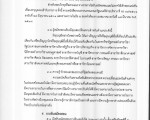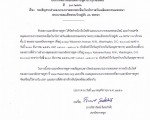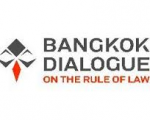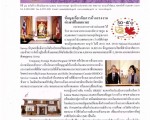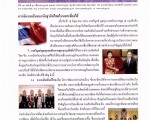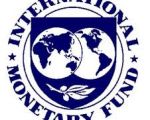
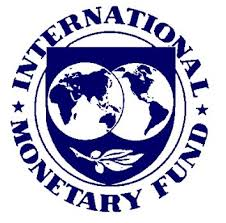 The International Monetary Fund praised Thailand’s skillful economic management in its latest annual review of the country’s situation, saying that moves by policy makers coupled with strong economic fundamentals helped the Kingdom avert the worst effects of global economic turbulence.
The International Monetary Fund praised Thailand’s skillful economic management in its latest annual review of the country’s situation, saying that moves by policy makers coupled with strong economic fundamentals helped the Kingdom avert the worst effects of global economic turbulence.
The IMF pointed to several positive aspects of Thailand’s economy and its management by policy makers, including low inflation, healthy balance sheets of commercial banks and corporations, high international reserves, and a moderate level of public debt. These have helped blunt the impact of recent severe shocks and are underpinning a recovery. In its report, the Fund encouraged Thai authorities to persevere in their efforts to rebuild fiscal buffers, strengthen financial stability, and promote more inclusive growth to cope with economic risks.
Those risks are “dominated by external factors”, according to the IMF. Thailand is an export-driven economy, and sluggish recoveries and potential weaknesses in key markets such as the United States, Europe, Japan – and especially China – could have a negative knock-on effect on the Thai economy. While the IMF said that an escalation of the European crisis or fiscal policy shocks in the United States were becoming less likely, those risks were still “skewed to the downside,” meaning they should be taken into account and countries such as Thailand should prepare for them.
Consumption has been growing as a component of the Thai economy, and stimulus policies and programs initiated by the administration of Prime Minister Yingluck Shinawatra have worked to kick consumption even higher during her first two years in office. But some of those programs, such as tax incentives for first-car buyers, have come to an end, and so consumption has begun to slow.
“The external environment remains challenging and domestic tailwinds are weakening,” the IMF said in the assessment’s conclusion.
The Fund said that political stability has strengthened in Thailand, but remains a risk factor. Public infrastructure investment programs that are scheduled to begin next year should be an engine that will support growth. Housing prices remain robust, credit has expanded, but consumer confidence has weakened.
The most controversial recommendation from the Fund was for Thailand to end its rice-pledging program, which has incurred losses to the government. Because of external risk factors, the Fund said Thailand would be better off not absorbing such losses. The IMF urged policy makers to adopt alternative ways to provide assistance to rice farmers, such as through direct or conditional cash transfers.
Minister of Finance Kittirat na Ranong rebutted the IMF’s recommendation, however, saying Thai authorities had a better understanding of the country’s farmers and had studied the best ways to support them and raise living standards.
- On 21 November 2013, H.E. Mr.Vijavat Isarabhakdi, Ambassador of Thailand to the United States of America, gave his speech at the Welcoming Luncheon organized by U.S – ASEAN Business Council
- Royal Thai Embassy hosted Fulbright Association Reception on 22 November 2013
- Prime Minister Yingluck Shinawatra’s televised statement on current political situation in Thailand on 25 November 2013
- On 25 November 2013, H.E. Mr.Vijavat Isarabhakdi, Ambassador of Thailand to the United States of America, delivered speech at the U.S. Chamber of Commerce
- ประชาสัมพันธ์ประกาศรับสมัครสอบแข่งขันตำแหน่งนักการทูต 2557
1012
views

Royal Thai Embassy hosted Fulbright Association Reception on 22 November 2013
นายวิชาวัฒน์ อิศรภักดี เอกอัครราชทูตไทยประจำสหรัฐอเมริกา เป็...

Silicon Valley start-up accelerator expands to Thailand
The Founder Institute, a Silicon Valley-based technology sta...

Facebook Chat What's the Plus in Erasmus+?
On Monday 9 December the European Commission will be hostin...

Thai firms to invest $2 billion in solar power
Thailand is poised for a solar energy boom as private compan...

Thailand extradites five drug suspects to the United States
Thai authorities extradited five suspected international dru...

Second Round of Programme Representative Elections
If you missed the opportunity to nominate yourself for the P...

Update on the Elections for Programme Representatives!
Check out the first Programme Representatives and the ongoin...

เรียนฟรี กับกิจกรรม styling your space ที่ dii school
Interior Decorator Stylist Workshop สำหรับท่านที่สนใจอาชีพ ...

Board of Trade joins with fishing groups to fight labor abuse
Thailand’s Board of Trade has come on board with eight fishi...

University of Leicester มอบทุนการศึกษาในระดับปริญญาเอก สาขาวิศวกรรมศาสตร์ ที่ประเทศอังกฤษ
สวัสดีจ้าเพื่อน ๆ วันนี้ก็มาชมข่าวเกี่ยวกับทุนการศึกษาจากต่า...

University of Sussex มอบทุนการศึกษาในระดับปริญญาเอก ให้กับนักศึกษาต่างชาติ ปี 2557 นี้
ทุนการศึกษาถัดไปที่น่าสนใจของวันนี้ ที่ ScholarShip.in.th นำ...

20ทุนไทยพัฒน์ รัฐบาลให้ไปเรียนต่อต่างประเทศ ระดับปริญญาโท-เอก
สำนักงาน ก.พ. ได้รับพระมหากรุณาธิคุณจากพระบาทสมเด็จพระเจ้าอย...

ทุนมูลนิธิการศึกษาไทย-อเมริกัน (ฟุลไบรท์) ประจำภาคฤดูร้อน 2557
สถานทูตอเมริกันประจำประเทศไทย ร่วมกับมูลนิธิการศึกษาไทย-อเมร...

University of Strathclyde มอบทุนการศึกษาในระดับปริญญาตรี ให้กับนักศึกษาชาวต่างชาติ ในทุก ๆ สาขาวิชา
มาชมทุนการศึกษาต่อไปของวันนี้ ScholarShip.in.th นำมาฝากเพื่อ...

QBM มอบทุนปริญญาเอกเต็มจำนวน ศึกษาต่อประเทศเยอรมนี
The Graduate School of Quantitative Biosciences Munich (QBM)...

ผู้ช่วยเจ้าอาวาสวัดบวรฯ เผย "พระเกศา-พระโลหิต" พระสังฆราชกลายเป็นพระธาตุ
เมื่อวันที่ 10 ธันวาคม ที่วัดบวรนิเวศวิหาร พระราชรัตนมงคล ...


